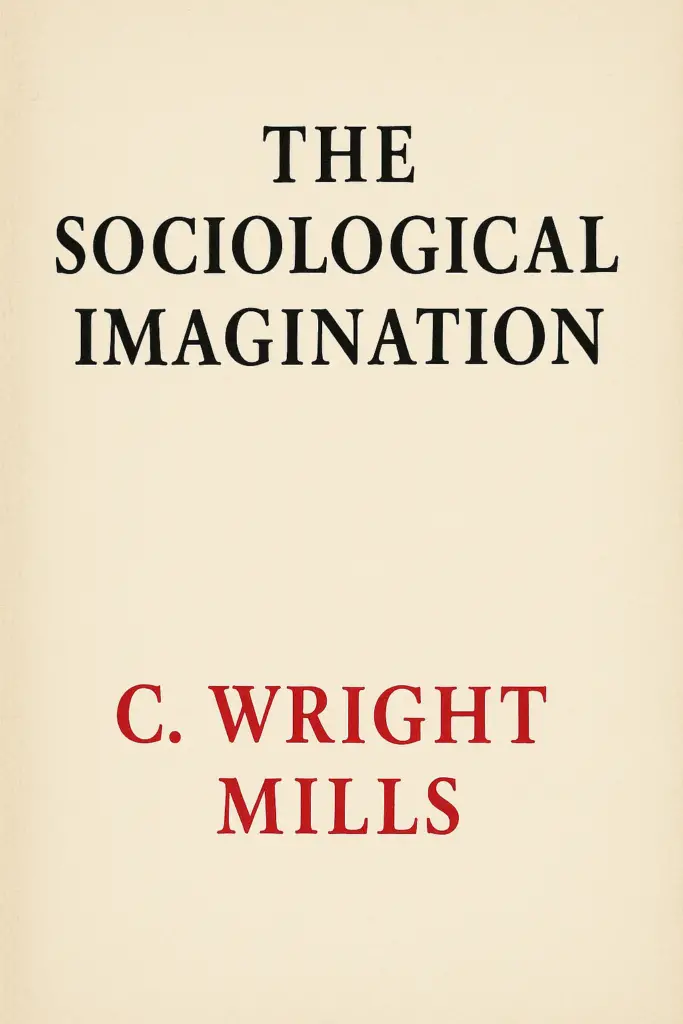C. Wright Mills’ The Sociological Imagination, published in 1959, stands as a seminal work in sociological theory and a passionate critique of the state of social science in post-World War II America. More than just a textbook, it is a manifesto, a call to arms for sociologists to engage with the vital connections between individual lives and the broader sweep of history and social structures. Mills argued that individuals often feel trapped by their personal problems, unable to grasp the societal forces shaping their experiences. He advocated for the development of a “sociological imagination,” a mental toolkit enabling individuals to understand their place within the intricate web of social relations and historical processes. This summary will discuss the core concepts presented in the book, and explore its key arguments.

I. The Promise of the Sociological Imagination
Mills begins by outlining the fundamental promise of sociology: to empower individuals with the capacity to understand their personal troubles within the larger context of public issues. He argues that individuals often experience a sense of unease and alienation, a feeling of being overwhelmed by the complexities of modern life. This feeling stems from a lack of connection between their personal experiences and the broader social forces that shape their lives. The sociological imagination, according to Mills, is the key to overcoming this alienation.
Troubles vs. Issues
Mills differentiates between “personal troubles of milieu” and “public issues of social structure.” Personal troubles are problems that occur within the immediate range of an individual’s direct relations with others. They are private matters that can be resolved by the individual. Public issues, on the other hand, transcend the individual and are related to the organization and institutions of society. They are matters that require broader societal solutions. For example, a person’s unemployment might be a personal trouble if it’s due to a lack of skills or poor work ethic. However, widespread unemployment affecting a large segment of the population is a public issue rooted in economic structures and policies.
Linking Biography and History
The sociological imagination allows us to connect personal biographies to historical forces. It enables us to see how our individual lives are shaped by the historical periods in which we live and by the social structures that exist within those periods. To truly understand ourselves, we must understand our place in history and society. For instance, the opportunities available to a young woman in the 1950s were vastly different from those available to a young woman today. Understanding this historical context is crucial to understanding their individual life experiences.
Developing a Critical Perspective
The sociological imagination is not simply about understanding social structures; it is also about critically examining them. It encourages us to question the status quo, challenge established power structures, and consider alternative ways of organizing society. This critical perspective is essential for social change and for creating a more just and equitable world.
II. The Grand Theory and Abstracted Empiricism
Mills critiques two dominant trends in American sociology at the time: “grand theory” and “abstracted empiricism.” He argues that both approaches fail to live up to the promise of the sociological imagination.
Grand Theory (Talcott Parsons)
Mills criticizes the grand theoretical approach of Talcott Parsons, whose work he sees as overly abstract and detached from the realities of everyday life. Parsons’ structural functionalism, with its complex jargon and intricate models, attempts to create a unified theory of social systems. Mills argues that this approach often sacrifices substance for form, producing overly complicated and ultimately meaningless descriptions of social structures. He believes that grand theory, in its pursuit of universal laws, often ignores the specific historical and cultural contexts that shape social phenomena. Mills argues that Parsons’ work often supports the status quo by emphasizing social order and stability without adequately addressing issues of power, inequality, and social change.
Abstracted Empiricism (Paul Lazarsfeld)
Mills also critiques “abstracted empiricism,” an approach characterized by the use of sophisticated quantitative methods to study narrowly defined problems. He criticizes Paul Lazarsfeld and his colleagues for focusing on meticulously gathering data on specific social phenomena, such as voting behavior or consumer preferences, without connecting these findings to larger social and historical contexts. Mills argues that this approach often leads to trivial and irrelevant research that fails to address important social issues. He believes that abstracted empiricism prioritizes methodological rigor over substantive meaning, resulting in a “methodological inhibition” that prevents sociologists from asking big questions and engaging with complex social problems. The focus on quantifiable data often leads to the neglect of qualitative insights and the subjective experiences of individuals.
III. The Importance of Reason and Freedom
Central to Mills’ vision of the sociological imagination is the belief in the importance of reason and freedom. He argues that these two values are essential for creating a just and democratic society.
Reason
Mills believes that reason is the foundation of critical thinking and informed decision-making. He argues that individuals should be able to understand the world around them, analyze social problems, and develop rational solutions. This requires access to information, education, and the freedom to engage in open debate. Mills sees the decline of reason as a threat to democracy. When individuals are unable to think critically and make informed decisions, they become susceptible to manipulation and propaganda.
Freedom
Mills defines freedom not simply as the absence of constraint, but as the opportunity to shape one’s own life and participate in the shaping of society. He argues that individuals should have the power to make choices about their own lives and to influence the political and economic structures that shape their destinies. He sees the concentration of power in the hands of elites as a threat to freedom. When individuals lack the power to control their own lives, they become alienated and disengaged from society.
The Role of the Intellectual
Mills emphasizes the crucial role of intellectuals, especially sociologists, in promoting reason and freedom. He argues that intellectuals have a responsibility to use their knowledge and skills to inform public debate, challenge power structures, and advocate for social change. They must be independent thinkers, willing to speak truth to power, even when it is unpopular. Mills calls for a “new left” intellectual movement that is committed to social justice, participatory democracy, and critical engagement with the dominant ideologies of the time.
IV. The Bureaucratic Ethos and the Power Elite
Mills identifies two major trends in modern society that he sees as threats to reason and freedom: the growth of bureaucracy and the rise of a “power elite.”
The Bureaucratic Ethos
Mills argues that modern societies are increasingly dominated by bureaucratic organizations. He defines bureaucracy as a system of organization characterized by hierarchy, specialization, impersonality, and adherence to rules and regulations. While bureaucracy can be efficient and effective in achieving specific goals, it can also lead to a loss of individual autonomy, creativity, and critical thinking. The bureaucratic ethos, according to Mills, promotes conformity, obedience to authority, and a narrow focus on technical expertise at the expense of broader social and ethical concerns.
The Power Elite
Mills argues that power in modern societies is increasingly concentrated in the hands of a small group of individuals who control the major institutions of society: the military, the corporations, and the government. He refers to this group as the “power elite.” These individuals, according to Mills, share a common background, worldview, and set of interests. They operate behind the scenes to make decisions that shape the lives of millions of people, often without public scrutiny or accountability. Mills argues that the power elite represents a threat to democracy because it undermines the principles of popular sovereignty and public participation.
V. The Crisis of Modernity
Mills expresses deep concern about the state of modern society, which he sees as being in a state of crisis. He identifies several key aspects of this crisis:
Alienation
Mills argues that modern individuals are increasingly alienated from their work, their communities, and themselves. This alienation stems from the bureaucratic organization of work, the decline of traditional communities, and the loss of meaning and purpose in life.
Anomie
Mills argues that modern societies are characterized by a state of anomie, a condition of normlessness and social disintegration. This anomie results from the rapid pace of social change, the erosion of traditional values, and the breakdown of social bonds.
Moral Drift
Mills expresses concern about the decline of moral values in modern societies. He argues that individuals are increasingly guided by self-interest and a lack of concern for the well-being of others.
VI. The Craftsman Ideal and the Sociological Vocation
Mills offers a vision of the sociologist as a “craftsman,” an independent thinker who uses his or her skills and knowledge to understand and address social problems. He emphasizes the importance of intellectual integrity, independence of thought, and a commitment to social justice.
The Craftsman
Mills encourages sociologists to approach their work with a sense of passion, creativity, and dedication. He believes that sociologists should be actively involved in the research process, shaping their own questions, collecting their own data, and developing their own interpretations. The craftsman ideal emphasizes the importance of intellectual autonomy and the freedom to pursue one’s own research interests.
The Vocation
Mills views sociology as a vocation, a calling that demands a commitment to the pursuit of knowledge and the betterment of society. He argues that sociologists have a moral responsibility to use their skills and knowledge to address social problems, challenge power structures, and advocate for social change. The sociological vocation, according to Mills, requires a willingness to engage in public debate, to speak truth to power, and to stand up for one’s convictions.
Critical Evaluation
The Sociological Imagination had a profound impact on the field of sociology. It inspired a generation of sociologists to engage in critical analysis of social structures and to address pressing social issues. It also contributed to the development of critical sociology, a perspective that emphasizes the importance of power, inequality, and social change.
However, Mills’ work has also been subject to critique. Some critics argue that his critique of grand theory and abstracted empiricism is overly simplistic and unfair. They contend that both approaches have made valuable contributions to our understanding of society. Others criticize Mills for his elitist view of intellectuals and his romanticized vision of the craftsman. They argue that his emphasis on individual autonomy and intellectual independence overlooks the importance of collaboration and teamwork in sociological research. Finally, some critics argue that Mills’ analysis of power is overly deterministic and neglects the agency of individuals and social movements. Despite these criticisms, The Sociological Imagination remains a powerful and influential work. It is a reminder of the importance of critical thinking, intellectual integrity, and a commitment to social justice. It continues to inspire sociologists and other social scientists to engage with the vital connections between individual lives and the broader sweep of history and social structures. It underscores the continuing need for the sociological imagination, a capacity now more critical than ever in a world marked by increasing complexity, interconnectedness, and inequality. It challenged the field to be more relevant, more engaged, and ultimately, more helpful in understanding and shaping the world around us. Its legacy lies in its call to action, urging sociologists to not just observe society, but to actively participate in its transformation towards a more just and equitable future.


